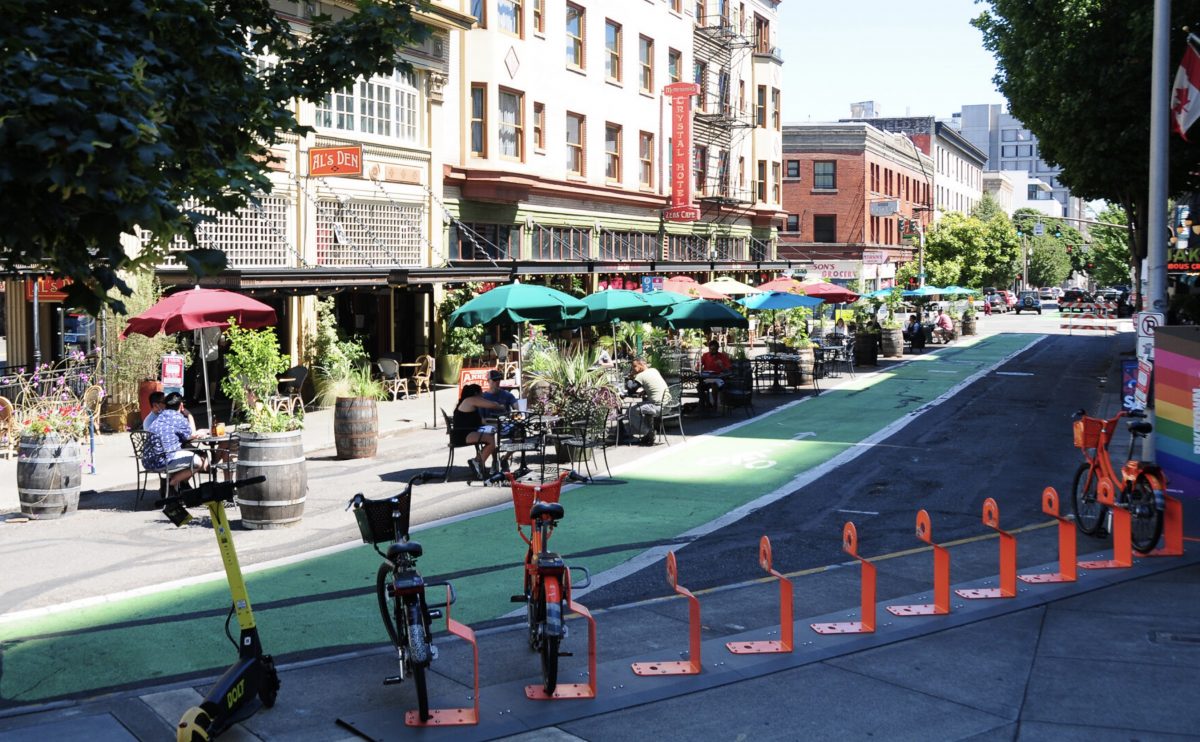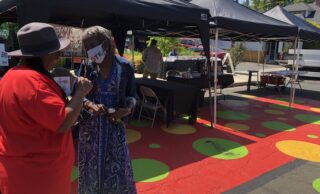
(Photo: Jonathan Maus/BikePortland)
Since she was elected as city commissioner in November 2018, Jo Ann Hardesty has shared vision of Portland where it’s easier to get around without using a car. Just weeks after she was handed responsibility of the transportation bureau at the start of this year, her policy director said “closing some roadways permanently to car traffic” was Hardesty’s top priority.
On Thursday Hardesty announced seven public plazas she said are, “a wonderful first step towards this vision.” The announcement was part of a larger campaign from the Portland Bureau of Transportation to encourage people get outside and take advantage of rising vaccination rates and temperatures.
For almost a year now Portlanders have become used to the site of restaurants and businesses using street space for dining and other activities as part of PBOT’s Healthy Business program (part of their multi-pronged Safe Streets Initiative to respond to the Covid-19 pandemic that was announced one year ago today). While these plazas are more evolution and less revolution, they mark a steady march forward from PBOT to fulfill Commissioner Hardesty’s vision — rooted more in a spirit of access and equity than a “war on cars”.
Advertisement
“These community meeting spaces where we have benches and trees and music and art and all sorts of stuff. I’m really excited that we are looking at how do we do that all over the city.”
— Jo Ann Hardesty, city commissioner

(Photo: City of Portland)
PBOT has always had an outdoor dining permit program, but it was limited to the sidewalk. Those permits expanded when Covid hit to allow takeover of curb lanes and even full streets. Now PBOT is taking even more steps forward. A $47,000 grant from Travel Oregon last month and $3.5 million in the city budget (via the American Rescue Plan) to support the program gives PBOT the validation they need to continue, solidify, and expand the plazas.
The first batch of seven plazas reveal partnerships with local organizations and businesses and new programming that take these spaces to the next level. Some of the locations announced yesterday already exist as dining plazas and others aren’t scheduled to open until next month.
At a PBOT Bureau Budget Advisory Committee meeting on May 20th, Policy Director for Commissioner Hardesty Derek Bradley hinted that his office sees these one-block plazas as just the first phase of a larger plan that would lead to larger carfree spaces. “She’s definitely interested in exploring multi-block closures, sort of like a real expansive plaza creation… and that’s something she’d love to see in all corners of the city. So yes, we expect to see more of this. Should Commissioner Hardesty keep PBOT for a long period of time, expect to see more of this programmatic planning to come to fruition.”
Two days before that budget meeting, Hardesty attended a meeting of the PBOT Pedestrian Advisory Committee where she reflected on her May 15th visit to the Dream Street Plaza, a “Black-centered Space for community and microenterprise in historic Albina” located on North Sumner and Martin Luther King Jr. Blvd. “It was exactly what I had imagined when I inherited PBOT,” she said excitedly. “These community meeting spaces where we have benches and trees and music and art and all sorts of stuff. I’m really excited that we are looking at how do we do that all over the city.”
Advertisement
“At some point we need to figure out how it’s funded,”
— Chris Warner, director of PBOT
Hardesty’s lived experience in east Portland helps explain why she’s so enamored with carfree spaces. “Where I live we don’t have spaces where people just come together to congregate,” she told the committee.
But if she wants to create more of them, funding will be an issue. These plazas are free of cars but they aren’t free of expenses. PBOT staff time, lost revenue from parking spaces, equipment rentals — the city’s cost will go up as they build the program. So far one reason the business permits have been so popular is that they’re free. Eventually PBOT will need to charge for them.
“At some point we need to figure out how it’s funded,” PBOT Director Chris Warner cautioned at this month’s budget advisory committee last week. Derek Bradley said the commissioner is, “Dedicated to figuring out long term funding mechanisms” and that the conversation dovetails with Hardesty’s other big priority for PBOT: How to wean the agency off their counter-productive reliance on fossil-fuel funding sources like gas taxes and auto parking fees.
Those tough funding conversations will be much easier with such a strong champion for the program. During her visit to the Dream Street Plaza earlier this month, her love of the idea — and how it fits with her vision of post-pandemic recovery — was on full display: “I am so looking forward to the city we get to build. I refuse to go back to what we had!” she exclaimed while standing on the brightly painted street. “I’m not going back! Are you going back?!”
Here’s are a map with the locations and descriptions of the plazas announced yesterday;
— Jonathan Maus: (503) 706-8804, @jonathan_maus on Twitter and jonathan@bikeportland.org
— Get our headlines delivered to your inbox.
— Support this independent community media outlet with a one-time contribution or monthly subscription.


